I have been working on OLPC in Nepal for over 18 months and it has been an incredible ride. I have learned how to navigate Nepal's educational bureaucracy, worked 70-80 hours per week consistently, and gotten to know some truly talented people. Ivan Krstic's recent blog post inspired me to write about my own personal journey with OLPC.
In the last few months we have had some incredible breakthroughs:
- The Danish IT Society has donated 200 XO's for Nepal's Spring Pilots and agreed to raise funds to buy laptops for later deployments.
- The OLE Nepal development team has developed some fantastic learning activities in the E-Paati Educational Suite. I remember beaming with pride when members of Birmingham's implementation team told me that they would love to use E-Paati for their deployment.
- In early March, the Danish Embassy agreed to fund our work implementing Nepal's deployments at Bishwamitra and Bashuki, our community activities, and content development for the next 12 months.
I have gotten a number of e-mails from individuals seeking advice on how to start a grassroots OLPC organization. I am really flattered that they seek out my counsel but I must make it clear that I am just one member of an extremely talented team. Rabi Karmacharya, Dr. Saurav Dev Bhatta, Mahabir Pun, Sulochan and others and others have put an incredible amount of work to get us this far and deserve the lion's share of the credit. I just happen to be the team member that writes the most blog posts and consistently spams the various OLPC mailing lists.
Starting with OLPC Nepal
So how did we get here? That is a story in itself. I have been working outside the US for the last six years, mostly as a career member of the US Foreign Service, in the Middle East, China, and most recently Kathmandu. A consistent theme in my travels has been the importance of educational infrastructure and its frequent neglect vis-a-vis physical infrastructure.
OLPC captured my imagination from its first announcement. In spring of 2006, I got appointed as the IT Manager for the US Embassy in Kathmandu, Nepal. I contacted Walter Bender to find out if anyone was working on OLPC in Nepal. He put me in contact with a group of passionate young engineers working with an A-Test Board. This original group coalesced into a larger team within a few short months.
Rabi Karmacharya, Mahabir Pun, Shankar Pokharel, Ankur Sharma, myself and others formally established OLPC Nepal in November of 2006 to advocate, develop content, and implement OLPC Nepal. We worked hard to raise the public profile of OLPC and secure a government pilot. Those were exciting times. In May of 2007, our hard work paid off when the Education Minister publicly committed to a pilot of OLPC.
On to OLE Nepal
In July of 2007, OLPC Nepal split over irreconcilable differences of how to implement OLPC in Nepal. Our sudden success brought to light that amongst ourselves we had very different ideas of how to implement this project. Mahabir, Rabi, and myself left to form OLE Nepal. Anyone who has ever started a business or non-profit group knows that this is a common occurrence.
A group of friends start a project with a common goal but fuzzy ideas how to reach that goal. Over time, team members come to differing plans. Sometimes those differing plans can be reconciled, sometimes not. I have seen this phenomena in Boy Scout troops, startup companies, and sports teams. We are still on amicable terms with the OLPC Nepal team and support their efforts. We are particularly proud of their translation activities.
In August of 2007, I resigned from my career with the US Foreign Service to focus full-time on OLPC. My bank account and my parents still haven't completely forgiven me. Rabi started his transition out of managing a successful software company and Dr. Saurav Dev Bhatta joined the team as Education Director. Only one month earlier, Saurav had left his professorship in public policy at the University of Illinois with the intention of working in education reform in Nepal. The timing could not have been more fortuitous.
We formed a partnership with Open Learning Exchange, Inc. a Boston-based non-profit that support grassroots organizations that are committed to developing open content for education. OLE, Inc. is technology-agnostic and leaves it up to its grassroots partners to decide which technology to use. OLE Nepal has committed to OLPC's technology and OLE, inc. has been supportive of our decision. It is really, really hard to get a non-profit off the ground and I can't overstate how helpful OLE, Inc. has been in terms of providing assistance with logistics, management advice, and connections to donors.
Now we have a full-time staff of 15 people and a number of dedicated volunteers. We have come a long way in a very short period and the most exciting days are ahead of us.
Some of the things I have learned along the way:
Teachers are the real Implementers of this Project
Teachers will be the key to this project's success. We just visit schools while they will be there year after year. They have the respect of their communities while we are a foreign entity.
Integrity Matters
It is tempting to take shortcuts when the pressure is on, particularly of the ethical kind. This is a mistake. We have an excellent team in large part because of Rabi Karmacharya's impeccable integrity. Time and time again, team members have told me they committed to this initiative in significant part due to Rabi's leadership.
Volunteers Need Support
The XO and Sugar are packed with cutting edge technology. This makes it difficult for volunteers to contribute just a few hours a week to the project, with the notable exception of the Pootle translation system. It takes several hours just to catch up on what's happening in the project. We put a lot of time into documenting our work and training volunteers. http://blog.olenepal.org/index.php/archives/132
Volunteers Sometimes Come with their own Agendas
Unfortunately, some individuals come to this project seeking resources for their own activities or to pursue a narrow interest not connected to the core ideals of OLPC. Great ideas are plentiful; people willing and able to implement them are not
E-Library is still missing from the Open-Source stack
There are very, very few libraries in Nepal. The amount of Nepali-language resources online are pitifully few. one of the first things people say they want is an Internet accessible library stocked with Nepali literature, history, and art.
Unfortunately, most open-source Content-Management Systems can't scale to support a national digital library. The best candidate for building a scaleable content repository is the FedoraCommons (not related to Fedora Linux) package however it has a very steep learning curve and requires extensive custom development. We are working with developers from OLE, Cambridge to build a national E-Library for Nepal based on FedoraCommons that will feature a Nepali-language interface and workflow tools.
Nepali Parents care most about Math, English, and Science
This comes up again and again. People want the tools for basic education. In my opinion, teaching basic English, mathematics, and science in a constructivist manner is much harder than the higher subjects, and frankly, much more important.
There should be more than one OLPC organization in a country
OLPC is too important and large a project to be left up to one organization. I really wish there were many more than two organizations working on OLPC in Nepal. We will be successful when every organization working in education makes OLPC a cornerstone of their approach.
The Long and Winding Road
It will be a long, difficult process to reform educational systems so that they empower kids, teachers, and schools. It won't be done in several years, even 10. I and the rest of the OLE Nepal team are in this for the long run and I will make it my career to implement technology to enable this process.
Every once in a while I read pessimistic articles about the future of OLPC. You can dismiss those. I know a significant number of very dedicated people working at the grassroots level who are in this for the long run. We won't be deterred by bad press. If you aren't already part of this movement, please join us.
There is a long list of people that I want to thank for supporting me personally and OLE Nepal over the last 18 months. Here are a just a few:
- Santosh Gyawali
- Dr. Richard Rowe for teaching us how to become a professional organization
- Walter Bender, SJ Klein, John Watlington, C. Scott Ananian and many, many others at OLPC
- Shankar Pokharel and Ankur Sharma of OLPC Nepal for making me believe in this project
- Christoph Derndorfer and Aaron Kaplan of OLPC Austria
- The entire Squeak and EToys communities for supporting our activity development effors
- Bert Freudenberg
- Luke Gorrie
- Subir Pradhanang
- My Brother-in-law Christopher Sniffen, for telling me I would be stupid *not* to quit my job and work on OLPC full-time
- Tika Bhattarai, who invented the term "The Quality Divide" in education
- Satish Kharel who has helped out at the most critical junctures
- Dr. Kedar Bhakta Mathema, our lead advisor
- Mohan Das Manandhar, Dr. Pratibha Pandey and our entire Board of Directors
- Wayan Vota for consistently promoting our work
- Mahabir Pun for being a consistent source of inspiration
- And the whole OLE Nepal Team
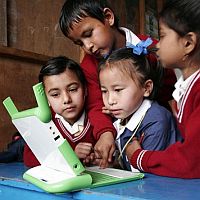
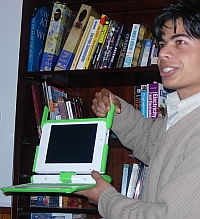
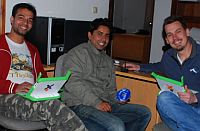
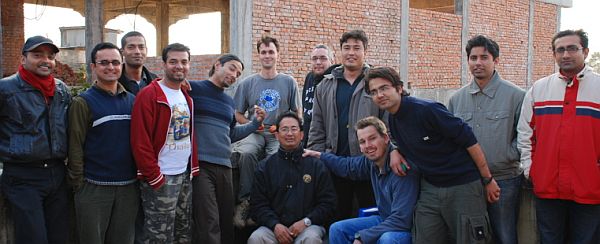
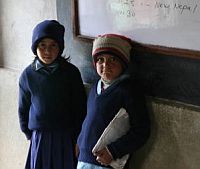
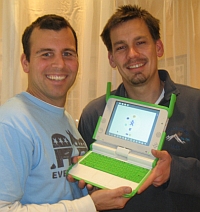


Could you comment on the successes/failures related to your efforts?
thanks,
Pat.
"Nepali Parents care most about Math, English, and Science
This comes up again and again. People want the tools for basic education. In my opinion, teaching basic English, mathematics, and science in a constructivist manner is much harder than the higher subjects, and frankly, much more important."
For Math and Science, Singapore has an excellent primary school curriculum available in English that has given it one of the best performing math and science programs in the world. Just use that. Don't import what's broken about the American educational system to foreign countries.
The $100 question at this point is not whether the grassroots are in it for the long haul, but whether OLPC is.
Tom,
That would be a $200 question (or at least $188).
adding to Bob's. My school in Texas actually has used the Singapore math curriculum our first year, and many private schools in the US use it. It's good, solid stuff, somewhat amenable to turning it into something an XO can carry. We then went to use Saxon Math, and found that one even better, and I think a better choice for adaptation to the XO approach.
Bob Wrote:
For Math and Science, Singapore has an excellent primary school curriculum available >in English that has given it one of the best performing math and science programs in >the world. Just use that. Don't import what's broken about the American educational system to foreign countries.
>>>>>>>>>>>>>>>>>>>>>>>>>>>>>>>>>>>>>>>>>>>>>>>>>>>>>>>>>
We would be happy to use the best materials depending on the costs and as long as it is open-source.
I am not importing the American education system to Nepal. Dr. Saurav Dev Bhatta is our education director (and a Nepali national) and he is in charge of working out the curriculum matters.
Is the curriculum simply the educational goals per year or does it include all the materials? I fear the Singaporean curriculum includes a lot of proprietary materials that Nepali government could never afford, in paper or digital form.
I'm pretty sure the Singapore curriculum is Free as in beer and speech, but Saxon Math? I don't doubt it's excellent. I don't know enough about pedagogy to evaluate it but the Google says so. It seems to be copyrighted. I know that copyright and patent law are funny when it comes to derivative works and I highly doubt Harcourt is going to donate a worldwide, non-exclusive, noncommercial license to use one of their acclaimed math programs for OLPC.
If the methods are sound and enough volunteers commit to a clean-room OLPC Saxon Math program, OLPC and other education programs win. Period. At least for mathematics education.
Pat,
We are documenting our experiences on our blog http://blog.olenepal.org
Teacher Training starts this Saturday March 29th
The full pilot won't start until April 24th.
There is also a lot of information on our wiki pages for the schools
http://wiki.laptop.org/go/Bashuki_Journal
http://wiki.laptop.org/go/Bishwamitra_Journal
Thanks for the long form update! The more folks can read about what you and other folks are doing, the better! If will overpower what negative press there is. I am curious about one thing: what do projects such as yours receive from OLPC in terms of communication from the officers, from the Sugar software developers, from other OLPC projects ....
Yes the olpc project is great..but whilst the planners plan the ice sheets melt and the sea birds swallow plastic..the point now is what are we going to teach thats really relevent ? we have ( or soon will have a student world connected up)
After 50 years teaching and seen the worst mistakes are made by the academics..it's time for the grass roots to do the planning...
The revolution is in the area of eco enterprise education with the focus on a much simpler curricula ..with the central aim to; " teach the child to learn " Singapore with it's problem solving approach is getting there.
The need now is some focus for this trend perhaps the academics could make a good job of planning this ??
..ian amor startup-asia Mian Channu Pk..
Hi Bryan! It's extremely good to see how quickly things are developing over there, very impressive stuff :-)